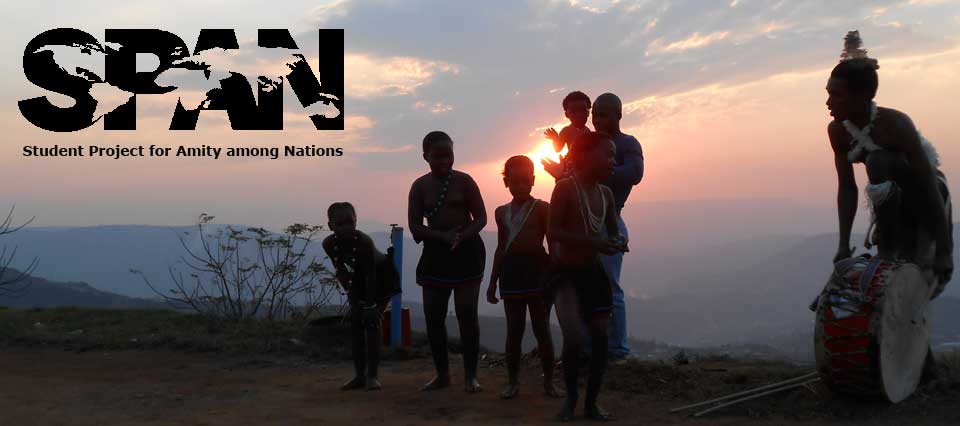1946: The idea of SPAN was born in the fall at Camp Ihduhapi, an annual gathering for university students to meet foreign students. “The Ihduhapi Five” were Jack Wiersma, Mary Ames, Doris Berg, Joann Clark, and Howie Williams. Having been impacted by WWII and inspired by the UNESCO charter that “since wars begin in the minds of men, it is in the minds of men that the defense of peace must be constructed,” they sought to do “[their] part in bringing about mutual understanding among the peoples of the world, and a truer and more perfect knowledge of each other’s ways of life.”
1947: The first year SPAN groups were sent to England, France, Spain, and Sweden. SPAN would not long stay limited to Europe as there was a perceived need to travel to other countries as students were more likely to travel to western countries in other contexts. University officials at the time wrote that this was “the first time that any American university has undertaken such a project as a part of its regular curriculum…”
1948: SPAN sent its first group to South America
1949: By the fall, the SPANners had given 175 speeches concerning SPAN to approximately 6,000 people, in addition to delivering a number of radio broadcasts to raise awareness. “SPAN spread because of its purpose,” said then University of Minnesota Dean Marcia Edwards. Governor Luther Youngdahl declared a SPAN week.
1956: The name Student Project for Amity among Nations, SPAN, was officially adopted.
1962: When Morocco Faculty Advisor Mohamed Ali Selim told the American ambassador in Rabat that he had 10 SPANners with him, the ambassador exclaimed, “My, it seems like 500. They are all over the place.” Initially the Moroccan government was uninterested in welcoming Peace Corps volunteers. However, Sen. Hubert H. Humphrey stated in Congress that after observing the character and behavior of the SPAN group, the Moroccan government requested a Peace Corps contingent. Referring to the 1962 Morocco group, he said that “American young people can and do make spontaneous, voluntary contributions to international understanding.” He drew President John F. Kennedy’s attention to the Morocco SPANners, calling them “trailblazers…to the Peace Corps.”
In the same year, a report sent from an Athens office to the U.S. Department of State highly praised the Greece SPANners saying that, “groups such as the 1962 SPAN do more for Greek-American relations than many of our official visitors.”
1964: John Scanlan, Turkey 1954, then serving in the American Embassy in Warsaw, wrote to then Administrative Official, Dean Mitchell Charnley that the Poland SPANners left a good impression “upon all who had anything to do with them. I’ve heard nothing but praise from Poles with whom they had contact; both in terms of their behavior…and in terms of the serious preparation which was evident from their comments and observations. Most of these students were at least as mature…as the carefully selected graduate students who come to Poland on other scholarships…”
1968: During the late 60s SPAN faced a number of challenges. Members of the business community shoed prejudices toward some of the students seeking donations for their trip. One businessman candidly states, “don’t send me a long-haired person.” It took time for businesses to accept such students. Moreover, some students felt there was no need to complete the academic paper following their time abroad, viewing SPAN’s academic requirements as “childish” and their responsibility to SPAN and the community at large as “just a lot of talk.”
1970: Following the challenges of recent years, a luncheon was held to discuss whether the SPAN program was still viable in a world different from that of 1947. The consensus was that the program was unique among foreign study programs and that its basic tenets were still as valuable then as at the beginning of SPAN.
1972: At the 25th Anniversary Banquet, SPAN alumni met with 1972 SPANners and were impressed “with how little that wonderful SPAN spirit [had] changed over the years.”
1974: To contain costs, a number of students discussed innovative means of travel to their destination countries. One group planned to drive down to Brazil, leaving mid-May and averaging 300 miles a day. In preparation, SPANner Mike McAllister even hitchhiked much of the route beforehand.
2002: Under a special University of Minnesota license, SPANners travelled to Cuba in spite of the U.S. embargo and travel ban. Faculty Advisor Mark Arneson described the experience as “mouth-dropping amazement. It was like stepping back in time. You work through the awe and amazement and it made it a very real place for real people.”
2019: SPAN moved to Hamline University.
